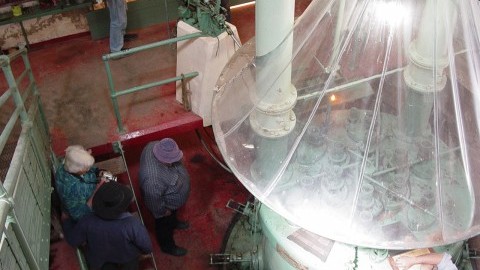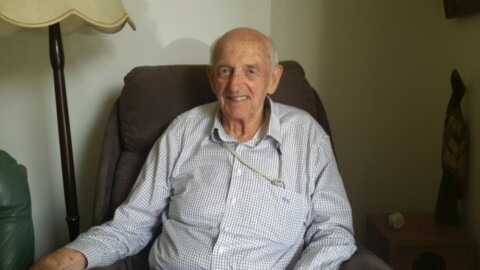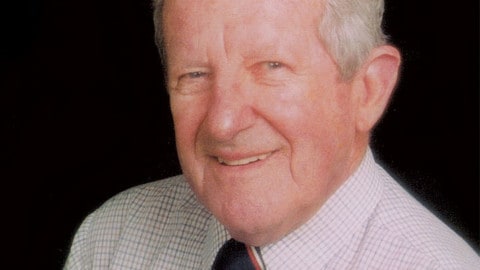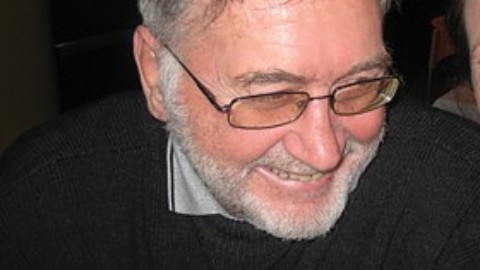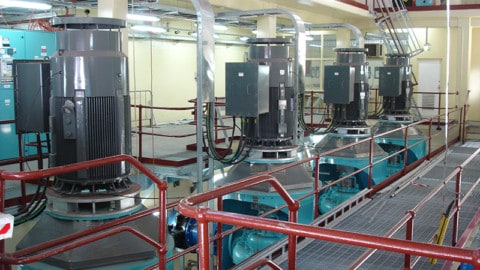Ken Willcock served as President of the Australian Pump Manufacturers Association (APMA), the forerunner to PIA from 1980-1982. A visit to the Snowy Hydro Mountains Scheme spurred an interest in engineering in Ken, which led to a career in pumps that began with Pomona Pumps and eventually led him to Singapore with Kelly & Lewis and finally General Manager of GAAM Engineering.
Chris Bland asked Ken a few questions about his career.
 How did you first get into the pump industry?
How did you first get into the pump industry?
I have always had a passionate love of classical music and one of my earliest positions was a music producer with the ABC. Like most young people of that era I wanted to visit Europe and the UK and on my return wanted to do something different, so I applied for a sales job with a spray irrigation company. This application was successful and I was sent to Shepparton which brought me into contact with the pump industry. My territory included Eastern Victoria and the Riverina, which required a lot of travelling.
On a visit to Cooma I visited part of the Snowy Mountains Hydro Scheme which gave me an incentive to attempt a tertiary qualification. That began ten years of night school and I finished up with a Certificate of Civil Engineering. During that time I met Bob Moore who was working for the Pomona Pump Company and I took on additional work as a spotter for Pomona deepwell pumps. This led to a full time job with Pomona which included a move from Shepparton to Melbourne. I stayed with Pomona for three years until the company was acquired by Clyde Industries. As there was a lot of uncertainty at this time I successfully applied for a position of Sales Engineer at Harland Engineering to promote and organise the marketing of Johnson deepwell pumps for which Harland held a manufacturing licence. In the meantime Bob Moore had also left Pomona Pumps and moved to Kelly & Lewis (K&L) which had been acquired by the large UK engineering company-Mather and Platt Ltd in 1961. I joined him there in 1962 not only to promote the KL Berkeley range of deepwell pumps but also to sell other products in K&L’s wide range.
Time moved on and in 1964 Bob Moore accepted the position of General Manager of his former company Pomona Pumps whilst back at K&L I was appointed Sales Manager (Standard Products) Mather and Platt-K&L’s parent company had appointed Englishman Harry Smith as General Manager of K&L in 1961 and in 1968 he enticed Bob Moore back to K&L as Sales Director to strengthen the sales team. At the same time K&L’s engineering department had been built up with the appointment of outstanding engineers Andy Gasuinas and Arthur Connor thus making K&L one of the world’s great pump companies
In 1970 K&L decided to open a sales and engineering office in Singapore to appoint agents and organise large engineering contracts for the region. This office also represented Mather and Platt UK and Mather and Platt-India. I was appointed South East Asian Manager which proved to be a very successful operation. This move also involved my wife and children the latter of which were educated in Singapore. We left there late 1975 as I had been appointed General Sales Manager of K&L.( Keith Sanders- now a councillor of PIA- took my place in Singapore) Bob Moore was then Managing Director of K&L as Harry smith had returned to the UK.
K&L had been members of the Australian Pump Manufacturers Association (the forerunner of PIA) since its inception and I had been on the council since 1976.1 was the elected President and served the mandatory two year term. At that time APMA produced its first Technical Handbook followed by the Pipe Friction Handbook.
K&L had had its own Board for many years and in 1978 I was appointed to the Board as Commercial Director. Wormald International had taken over the whole Mather and Platt Group (which included K&L) in 1976. The relationship with Wormald was not a happy one. Bob Moore had been posted to the UK as Managing Director of Mather and Platt and had left them to take up a position as Managing Director of SPP (another major UK pump company). A subsidiary of SPP was a small Australian pump company called GAAM Engineering and it was proposed that I accept the position of General Manager, which I accepted.
GAAM is a niche market operation that specialises in the manufacture of fire pumps for the majority of Australian Fire Services. A few years later SPP decided to divest itself of some of its smaller subsidiaries and was taken over by a Canadian company called Wajax Limited Whose main activity was the manufacture of fire pumps and fire hose. I was promoted to Managing Director and reported directly to Canada. This proved to be a very happy relationship and I retired from GAAM in 1995.
After that I did some consulting work for GAAM in Vietnam and for Weir Engineering in the Philippines. A very satisfying and rewarding career.
How has the industry changed during your time in it?
The pump industry has changed enormously over the last twenty years or so. The removal of tariff barriers started the decline which has never recovered. We have gone from a manufacturing industry with great technical and design excellence to an importing industry and to a large extent that excellence has been lost. Evan the major pump companies of the past are in the majority owned by overseas interests.
What is your most memorable moment from your career?
One memorable incident stands out. In January 1975 I made one of my regular trips to Jakarta and had with me a lot of cash in the briefcase I was carrying. I had lunch with the project manager building a new hotel and after lunch he instructed his driver to take me back to my hotel. We hadn’t gone far when I saw a rampaging mob coming towards the car. The driver stopped and said to me, “Go sir go!” “Go where?” I thought! So I turned and ran in the opposite direction and felt a hand on my shoulder. My first thought was that they’d caught me. Turned out a Chinese householder had seen what was going on and took me into his house for shelter.
The initial riots started as a anti-Japanese protest but the Chinese were concerned it could turn against them. After things had quietened down a little I managed to get a taxi to go back to the hotel.
Then the fun started. The mob were turning over cars and setting them alight and any Japanese car was fair game. The taxi I was in was a Holden so I had some immunity. After a hairy ride I got back to the hotel and opposite that was a group of shops which the rioters burnt to the ground. This went on for three days and on the fourth day the army moved in and broke it up. I flew back to Singapore having achieved nothing A number of people were killed but fortunately I was not among them.
Did you have a mentor at any time in the industry?
You will have gathered from my first statement that the only real mentor I had was Bob Moore. He was always there and played a big part in shaping my career in the pump industry. Not only career wise, but we have been very close personal friends since our early twenties and still see one another regularly. (Ed – see our interview with Bob Moore in the October 2012 issue – still available online).
Tell me about some of the other personalities in the industry that you have worked with?
There were so many good people in the industry it’s difficult to mention them all but some stood out. Among those were Alan Jackson, Bill O’Hehir David Parry Kevin Wilson (now secretary of PIA) Jim Grant, Roland Palme Arthur Conner, Bill Aitken, Arthur Feiner, David McCleish Bernie Hassell. Just to name a few!
What are the most significant developments you have witnessed in the industry?
I think that one of the most significant changes to the Australian pump industry is that we have gone from a manufacturing industry to a importing one, which was largely brought about as a result of the tariff enquiry For those companies still manufacturing the development of CNC machines and computer technology has had an enormous impact on manufacturing costs. And of course the high value of the Australian dollar has aided and abetted the importing of pumps.
What does the future hold for pumps?
The world couldn’t function without pumps and electric motors so one of the big challenges is that our industry keeps abreast of the advancement of hydro technology. One of the good things is that the technical education classes run by Keith Sanders is one way of doing this. I also believe that post graduate courses in hydraulic design are necessary.
What advice would you give young people in the pump industry?
I believe that young people coming into the industry today need not only knowledge of pump selection but of the whole hydraulic system to which the pump is being applied. This is an age of specialisation and it’s not sufficient just to have a sound knowledge of pumps. You have to understand the whole system.
Ken is no longer involved in the industry today other than being a life member of PIA and still has contact with old colleagues of “pump men”. His love of classical music has continued. As a boy he learnt piano, then following retirement decided to learn to play the trumpet and now plays with Stonnington City Brass, one of the better brass bands of Melbourne. He also play bowls with the Melbourne Cricket Club.



